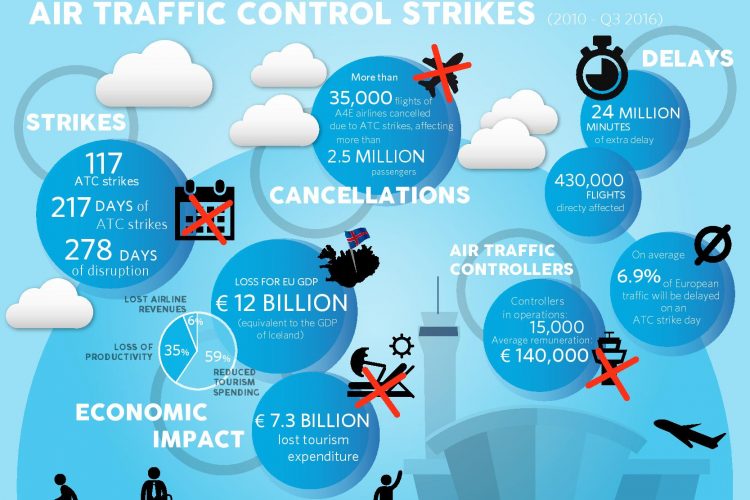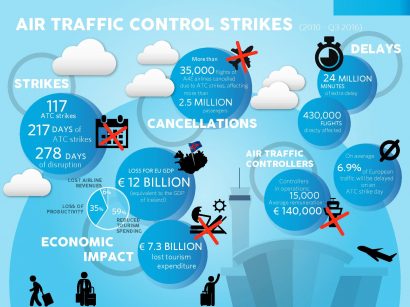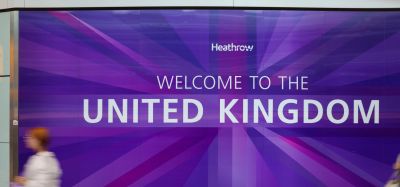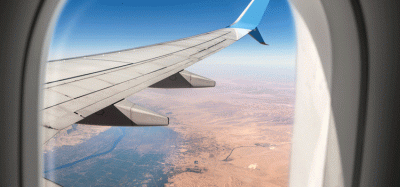Air traffic control strikes have cost €12 billion to the EU economy in seven years
Posted: 14 October 2016 | International Airport Review | 2 comments
A4E has released an updated version of a PwC study on the economic impact of Air Traffic Control (ATC) strikes in Europe…


- 217 ATC strike days since 2010 have affected the creation of 140,000 jobs, reveals updated PwC study.
- In 2016, 41 strikes have cost € 1.6 billion to the EU GDP.
- More than 100 flights cancelled due to short notice cancellation of ATC strike in Greece this week.
- A4E launches petition
A4E has released an updated version of a PwC study on the economic impact of Air Traffic Control (ATC) strikes in Europe. Now including the 2016 figures, the analysis reveals that since 2010 the overall impact of ATC strikes have cost €12 billion to the EU economy, associated with more than 140,000 jobs.
Since 2010, there have been 217 ATC strike days in the EU – equivalent to almost one month of strikes every year. In total, there have been 278 disrupted days until 30 September this year accounting the days before and after an ATC strike as flights had to be cancelled proactively in advance and accumulated delays spilt over to the next day.
Across the EU, ATC strikes occur most frequently in France, followed by Greece, Italy and Portugal and resulted in 35,000 cancellations and more than 7 million minutes of delay among A4E airlines. Europe’s tourism industry is the first victim of air traffic controllers’ strikes, with damages amounting to around €7.3 billion. Interestingly, some countries in which ATC strikes have occurred rely significantly on travel and tourism.
“These figures are shocking. Since 2010, 2.5 million passengers have seen their travel plans spoiled by the disproportionate industrial action undertaken by a group of 15,000 air traffic controllers. 2016 will be a record year for airlines – unfortunately, just in terms of ATC strikes. There have been 22 separate strikes in Europe, encompassing 41 days of strike, and 55 days of disruption.
“If Europe wants to create jobs and be competitive it should take action to ensure its reputation is not damaged, jobs are not affected and the daily life of Europeans is not impacted by this repeated action”, said Thomas Reynaert, Managing Director of A4E.
In 2016, 41 strikes have cost € 1.6 billion to the EU GDP…
This week European holiday makers witnessed a new phenomenon when a strike was again called off at last minute. Thousands of passengers still saw their travel plans disrupted when airlines had to cancel more than 100 flights to and from Greece even though the planned 4-day strike was called off at the very last minute, as the notice provided did not allow the airlines to reinstate all cancelled flights.
“Airlines need to be able to plan ahead to reduce the impact on passengers. They did their utmost to reinstate flights but the damage was done and cancellations could not be avoided anymore. It is unacceptable that air traffic controllers are infringing people’s rights again and again”, added Thomas Reynaert.
“A4E has repeatedly called on European authorities to take immediate action to protect the rights of European travellers.
We are launching “Keep Europe’s Skies open” – a petition where consumers can unite and let out their frustration about the continuous travel disruptions. A4E members will promote this petition via their social media and passenger information channels. We intend to present this petition in Brussels to urge the EU Commission and the EU Parliament to finally take action. The reputation of Europe is under threat”, concluded Reynaert.
Join our free webinar: Beyond silos: How ecosystem thinking elevates the airport experience
In today’s complex aviation landscape, airports are moving beyond siloed operations to embrace a new era of collaboration. This webinar focuses on how leading airports are using ecosystem thinking to adapt, personalize, and continuously improve every touchpoint, boosting both passenger satisfaction and non-aeronautical revenue.
Date: 13 Nov | Time: 10:00 GMT
REGISTER NOW TO SECURE YOUR SPOT
Can’t attend live? No worries – register to receive the recording post-event.



















There has been no strike action from British controllers in over 30 years. Why are they so prevalent elsewhere in Europe. It would be interesting if the causes could have been investigated and reported.
Last minute strikes provoke at airports several flight operation disrution caused by Local Unions in different countries also; fo instance in Argentina, there have been two important strikes, Pilots and crew members and Ground Handling services provoking several flight cancellations and a big economical damage to Aerolineas Argentinas flagship airline for that nation.
It is impossible to make an internartional airline to grow up in order to be self sustainable airline when its own workers or pilots an even airport and aeronautic staff do not think of paasenger and customer services employees are victms from their last minute decissions to strike.
We have to face very upset , angry and sometimes agressive passenger who see their plans of travelling have been disrupted by these actions, and the airline receive a strong economical damage.
Up to date, strike at airports and airlines staff is being a permanent situation and we airport customer services and passenger services agent never know what is going on the next day…Personally I believe something must be done and goverment has to legislate or make new plans or laws to avoid this to grow up in days to come.